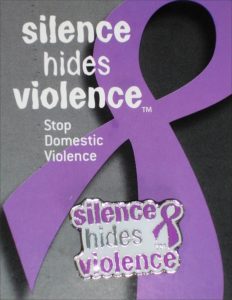By Brooke Davidoff

Unfortunately, “nearly three in ten women and one in ten men in the United States have experienced rape, physical violence, and/or stalking by an intimate partner (or former partner).”
Domestic Violence Awareness Month began in October 1987 to connect people seeking help with the organizations working to empower victims and educate the public. Progress has come a long way, but there is still much more work to be done. Stigma silences many victims of domestic abuse.
Domestic violence a heavily gendered crime, (although cis men can very well be the victims of domestic violence, and they can and should seek help). Furthermore, “LGBTQ members fall victim to domestic violence at equal or even higher rates” than their cishet counterparts, and they also experience unique elements of abuse, such as the threat of being outed. Domestic violence is absolutely a gender equity issue, and much work needs to be done to educate about and prevent abusive relationships. For now, knowing what to look out for and how to get help is the best way to keep yourself safe.
In a victimology class I took recently, we learned that intimate partner violence falls into four categories: stalking, psychological aggression, physical violence, and sexual violence. People experiencing intimate partner violence don’t always know right away that they are being abused, and abusers tend to be good at manipulation, leaving victims to question themselves when they consider leaving the relationship.
A few reasons people stay in abusive relationships:
Some people in abusive relationships want the abuse to end, but the relationship to last, and they find themself waiting for their abuser to change. Financial dependence is another reason some victims feel trapped with their abusers. Shame, guilt, helplessness, embarrassment, and fear are only a few of the emotions that can cloud one’s judgment when trying to decide to stay or go. On top of that, there is still stigma associated with speaking out and admitting you are a victim.
It is extra important for people to be aware of psychological aggression, because non-physical domestic violence can be difficult to recognize, but it can still cause potentially long-lasting trauma and emotional impacts. How do you know if you’re in an abusive relationship if there is no physical violence? Are you afraid of your partner? Are they extremely jealous? This screening helps you determine if it would be in your best interest to leave your partner for your own mental health and safety.
If it is possible that you are in an abusive relationship, there are many ways you can seek help:
On campus you can always stop by the RISE office in Haag Hall Room 108. They are open Monday – Friday 8 A.M. to 5 P.M. You can also visit their website.
Rose Brooks is a 24-hour emergency shelter in Kansas City.
The Kansas City Anti-Violence Project (KCAVP) is the only LGBTQ-specific domestic violence or sexual assault service in Missouri. KCAVP was created to provide support and services to lesbian, gay, bisexual, transgender, queer, and questioning victims of domestic violence, sexual assault, and hate violence.
For anonymous, confidential help available 24/7, you can also call the National Domestic Violence Hotline at 1-800-799-7233 (SAFE) or 1-800-787-3224 (TTY) now
If you need help, please reach out to one of these resources. There are people who can help you find a safe way out; you are not alone.